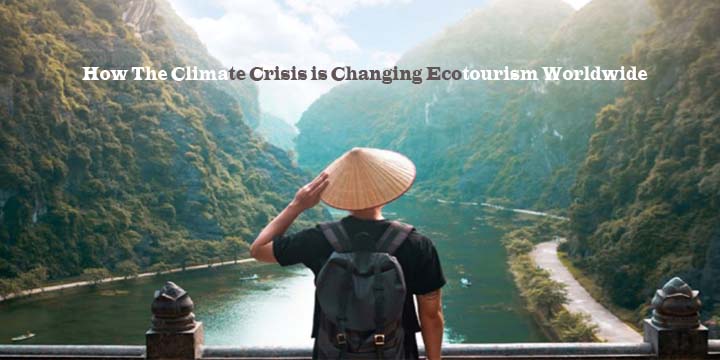How The Climate Crisis is Changing Ecotourism Worldwide
Ecotourism is a well-known practice amongst travelers. It was coined around the 1980s as it was used to describe the frequent exploration of undisturbed areas. At first, it placed importance on how to appreciate the beauty of nature without causing harm or destruction to the location. However, as time passed by, the definition of ecotourism expanded, and it went by different names.

Today, ecotourism is defined by The International Ecotourism Society as responsible travel to natural areas that conserves the environment, sustains the well-being of the local people, and involves interpretation and education. Meaning, it is no longer limited to nature itself but also encompasses the locals’ well-being and living condition.
This detail is the modern definition of ecotourism is especially important because humans are responsible for the climate crisis the entire world is combating. While some travelers are extremely conscious about what they do and what they leave behind in every place they go to, there are a select few who aren’t mindful of how they’re contributing to pollution and the destruction of the area they visit.
Tourists are largely responsible for upholding the principles and practices of ecotourism more than others as they are the ones largely exposed to the wonders of the world. They see how the once clear waters turn murky because of garbage left behind by humans, they know how the polar caps have been melting the past few years, they have seen how the forests burn because of the steadily increasing temperature.
While it is undeniable that there still exists numerous breathtaking views and uncharted territories around the world, what has become of the places that are already affected by the climate crisis? What happened to the magnificent views that people dreamed of seeing because of their natural beauty? Has the locals’ way of living also changed with the sign of the times? Are travelers now more conscious of their footprint in order to conserve the beauty of nature?
The good thing is, the number of people learning and practicing ecotourism is rising. More and more people are engaging with the practice and finding more sustainable means to enjoy the world and what it has to offer. They are getting concerned about the carbon emission caused by air travel, the wildlife that has been taken away from their natural habitats to be taken to zoos and parks, and trees that had to be taken down to have space for the tourists’ accommodation.
Tourists and Ecotourism Worldwide
Tourists could not do anything about this directly, so some create organizations and urge others to join in their advocacy to protect nature. They choose to spread awareness and dedicate themselves to having minimal impact on the places they visit. Some teach others how to travel more sustainably by suggesting which modes of transportation to take and reusable equipment to bring with them on their trips.
Ecotourism largely promotes the conservation of natural areas which means that travelers should bid adieu to “leaving their marks” by damaging nature. This includes carving names onto trees, burying a time capsule, throwing coins or bottles in bodies of water, and leaving behind notes or posters. Tourists can always resort to taking pictures as a remembrance thanks to technology instead of leaving behind a damaging mark.
No matter where people go, the locals and social media are always there to remind them to make meaningful memories and prioritize sustainability. They say this not just to protect the earth, but also its inhabitants. Thousands of people can lose their source of living and will be forced to change what they’re used to if tourists are not mindful of what they do on their travels.
Luckily, some local governments place the utmost importance on the conservation of their natural and cultural heritage as well as supporting the local communities commonly visited by travelers. They impose strict laws that prevent any kind of pollution, littering, disruption of cultural practices, and even degradation of cultural norms as they understand that this is deeply intertwined with the everyday lives of the locals.
Other than that, there are some countries that passed laws regarding the banning of the establishment of plants and other structures that largely contribute to climate change. Such structures use an excessive amount of fossil fuels such as coal, oil, and gas. This is because they are making a move towards the prevention of the further destruction of the ecosystem and the ozone layer. Some even limit the number of flights that come and go in an area to reduce carbon emissions.
With climate change’s seemingly irreversible effects on nature, the former beauty of some cultural sites, forests, and other locations have been severely affected. This is the main reason why everybody needs to take part in climate action in the tourism industry. Nature needs to be conserved – if not restored – in any way possible.



